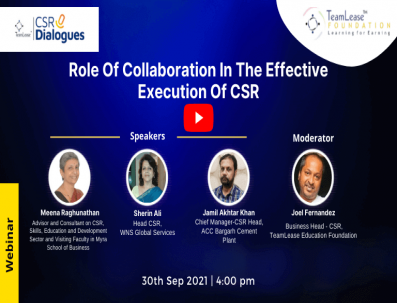
The role of collaboration and effective execution of CSR
Collaboration in CSR is the need of the hour. Organizations can scale the impact of their social responsibility initiatives by working together and subsequently aid the government and society in alleviating the lives of people in need. To shed light on how increasing collaborations and partnerships are on a welcoming trend and will be the future of CSR, we conducted a webinar on the topic of the role of collaboration and effective execution of Corporate Social Responsibility (CSR) on 30th September, Thursday.
To know more about CSR’s effective execution, we invited three esteemed panellists.
- Our first panellist Meena Raghunathan, started her career as the first woman to join the marketing division of Capella Pharma in 1984. In 2005, Meena Ranganathan joined GMR Varalakshmi Foundation and set up the GMR group's CSR. She is currently an advisor, a consultant on CSR skills, education and a visiting faculty at Myra School of Business.
- Our second panellist Jamil Khan is a CSR professional with over 18 years of experience and has won several awards for his work in CSR, some of them being the best corporate award in CSR bureaucracy. In 2016, the Innovative award in education was conferred on him by the Government of Orissa. Presently, Mr Khan is the CSR head of ACC Bargarh Cement Plant.
- Our third panellist, Sherin Ali is currently the location head in Pune of WNS Global Services; she has been with the organization for 11 years. Additionally, she was also the ambassador of the United Nations Sustainable Development Goals network 2020.
And I am Joel Fernandez, Business Head - CSR, TeamLease Education Foundation, the moderator of the session.
We started the webinar with our first question on the factors their respective organizations consider while evaluating the implementation agencies for CSR. Sherin shared her company’s policy of allocating CSR budgets. When the policy is built, they decide on the vision on how to create scale and impact for the objective. The identification and the implementation goes in from the view of the corporate. They look at the track record to create a bridge between the company’s vision and NGOs' vision. On the other hand, ACC Trust has its own organization and a partner NGO. They have formulated due diligence for the NGOs, which has six to seven parameters like competencies, geographical conditions, etc to check what NGOs have experienced in the past years. They also send 2-3 observers to the location of the project to find the impact of the work done before finalizing the NGO partner.
Meena Ranagathan has been on both sides of the spectrum. She has worked in an implementation agency for various large scale corporations and large programs across the country. They didn’t initially believe in outsourcing, but there are always exceptions. There was a time when they were running a mobile medical unit, which required highly qualified MBBS doctors onboard. This activity made them realise the importance of implementation partners. Even if there are corporate foundations to support, they don't hesitate to hire specialized experts from outside.
Moving towards our next question about the measure of progression or impact during the collaboration with the implementation partner. Most corporations have data on the projects they have executed so the partner organisations in the team facilitate meetings to see the results themselves, but that does not suffice. An ecosystem needs to develop, and it has to be more collaborative. The corporate has to approach it with some kind of Sense and Sensibility. ''A kind of collaborative approach between corporate and NGO, understanding each other's requirements, frequent field visits, meetings, internal evaluation, a multidisciplinary team, consisting of both corporate and NGO getting together can help understand better results', said Meena Raghunathan.
Jamil Khan continued sharing about the measures ACC uses to assess performance, usually issued to the ACC. They prepare an MoU with defined roles and responsibilities of a corporation as well as provide angles to take on some activities. CSR is completely a collaboration - one cannot work alone and one must mobilize. The ACC Foundation has formulated a CAP (Community Advisory Panel) to make sure that whatever CSR activities are implemented in the nearby areas bring about quality changes in the community.
The problem and challenge while implementing the CSR programs is the pressure of corporations for results. A close second is definitely the community reaction. To combat that, CSR teams hold various public speaking sessions for a healthier partnership. The journey of a CSR person is quite stressful with the community interaction because sometimes corporations present that CSR person as the face of the company. There is another side to the story. In some villages or particular areas, women, youth and farmers were really benefited from the programs initiated by ACC Foundation. So they came forward in support of the organization and agreed with their vision. An ideal implementation of a third party vendor includes trust and respect. The mission created in a corporation has to match the mission of the NGO.
An outperforming, expertise and result-driven attitude can help bridge the gap between the corporates and the third party agencies.
We concluded the webinar with a question from the participants about some avenues to be explored in CSR other than implementation agencies. Sherin Ali shared her thoughts on the importance of industry collaboration. One is with expertise in a particular field and the second is with community-based organizations.
In the end, as a member of TeamLease Education Foundation, I thanked the panellists as well the attendees for their precious time and knowledge. It was an insightful discussion with different perspectives of CSR collaborations and execution. Looking forward to having many more discussions on CSR dialogues in the future.





